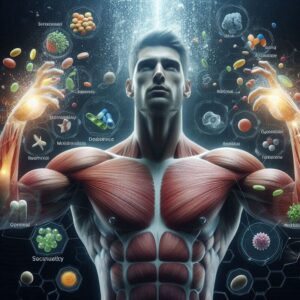Unlock Optimal Muscle Recovery Through Strategic Nutritional Choices
Understanding the specific macronutrient ratios in your diet is vital for achieving peak muscle recovery. The three fundamental macronutrients—protein, carbohydrates, and fats—are not merely energy sources; they are the cornerstone of your body’s structural integrity and play critical roles in numerous physiological processes. Each macronutrient has a unique function in repairing and regenerating muscle tissue. Therefore, individuals committed to improving their athletic performance and recovery must grasp how these nutrients interact synergistically to foster recovery and growth.
Among these nutrients, protein stands out as essential for muscle recovery because it comprises vital amino acids that facilitate effective muscle repair and growth. Adequate protein consumption following exercise significantly boosts muscle protein synthesis, the biological process responsible for forming new muscle proteins, while concurrently minimizing the breakdown of existing proteins. This delicate equilibrium is crucial for optimal muscle recovery, enabling swifter recuperation and adaptation to workout stress. Additionally, carbohydrates are indispensable for restoring glycogen reserves that are drained during intense workouts, supplying the necessary energy for subsequent training sessions. Lastly, fats are integral to energy production and hormone regulation, both of which are critical for the recovery process.
Identifying the ideal macronutrient ratio for muscle recovery necessitates a personalized strategy that considers individual factors like body composition, workout intensity, and specific fitness objectives. A commonly recommended guideline is to consume a combination of protein and carbohydrates within 30 minutes to 2 hours post-exercise to maximize recovery benefits. This timing is paramount because your body enters a heightened state of nutrient absorption during this recovery phase, making it the optimal time to nourish your muscles.

Explore the Best Protein Sources to Enhance Muscle Recovery
Recognizing that protein is more than just a dietary component—it’s a fundamental building block for muscle recovery—is essential for anyone involved in physical training. Protein provides the necessary amino acids that are crucial for both muscle repair and growth, making it imperative to incorporate protein-rich foods into your diet to enhance muscle restoration. High-quality animal protein sources, such as eggs, dairy products, lean meats, fish, and poultry, offer complete amino acid profiles that are particularly effective in promoting muscle regeneration and recovery.
For individuals who prefer plant-based options or want to diversify their protein sources, there are numerous nutritious alternatives available. Foods like lentils, chickpeas, and black beans not only deliver essential nutrients but are also high in protein, contributing positively to muscle recovery. Additionally, the versatility of tofu, tempeh, edamame, and other soy-based products makes them excellent complete protein sources that can be seamlessly integrated into a well-balanced diet aimed at supporting muscle healing.
Moreover, protein supplements such as whey, casein, or plant-based powders can effectively enhance your protein intake specifically for muscle recovery. These supplements offer a convenient means to ensure you meet your post-workout protein requirements, allowing for easy incorporation into smoothies, shakes, or meals, thereby maximizing your recovery potential.
Replenish Glycogen Stores with Carbohydrates for Superior Muscle Recovery
Carbohydrates are crucial for muscle recovery, as they help restore glycogen stores that are depleted during vigorous physical activity. Consuming carbohydrates within the first 30 to 60 minutes after exercise can significantly aid in replenishing energy levels and accelerating muscle regeneration. During intense workouts, your muscles primarily depend on glycogen as their main energy source, and the body operates most efficiently at storing glucose immediately after exercise. Consequently, the timing of carbohydrate intake is critical and can greatly impact muscle glycogen synthesis and overall recovery outcomes.
Integrating a variety of nutrient-dense foods, including legumes, fruits, and vegetables, which are abundant in natural sugars and starches, can significantly enhance your muscle recovery while providing myriad health benefits. These foods are rich in fiber and loaded with essential nutrients, delivering a steady energy release and the vitamins and minerals necessary for overall well-being and efficient recovery. By emphasizing these complex carbohydrates in your meals, you make informed dietary choices that substantially support your body’s nutritional requirements.
Effective post-exercise nutrition is a cornerstone of muscle recovery. Combining carbohydrates with protein can dramatically enhance muscle glycogen resynthesis and promote effective muscular repair. This powerful nutrient pairing also stimulates insulin release, facilitating the transport of glucose and amino acids into muscle cells, further optimizing recovery and repair processes.

Incorporate Healthy Fats for Comprehensive Muscle Recovery Benefits
While protein and carbohydrates often take center stage in discussions about muscle repair, dietary fats are equally significant for a comprehensive approach to recovery and overall bodily function. Healthy fats are vital for hormone production, particularly testosterone, which plays a crucial role in muscle growth and repair mechanisms. Foods rich in omega-3 fatty acids, such as walnuts, flaxseeds, and fatty fish, provide anti-inflammatory benefits that can help mitigate exercise-induced inflammation and accelerate muscle recovery. Additionally, these fatty acids are essential for the construction of cell membranes crucial for muscle repair.
Incorporating a wide variety of healthy fat sources, including nuts, seeds, avocados, olive oil, and fatty fish, can offer substantial advantages for your overall health and muscle regeneration. These fats are not only flavorful but can be easily included in your post-exercise meals or snacks, providing essential energy while supporting various physiological processes related to recovery. Make an effort to explore different options and consciously include healthy fats in your diet; your muscles will undoubtedly benefit from these choices!
While fats are an essential component of a balanced diet, moderation is key. It’s important to avoid excessive consumption of unhealthy fats, such as trans and saturated fats, as these can promote inflammation and impede overall healing and performance. Striking the right balance of fats in your diet is necessary for achieving optimal muscle recovery and overall health.
The Vital Role of Hydration in Optimizing Muscle Recovery
One of the most commonly overlooked aspects of muscle recovery is the essential role of hydration. During physical activity, our bodies experience fluid loss through sweating, and neglecting to replenish these lost fluids can lead to dehydration. This condition can severely impair performance and prolong muscle recovery time. Dehydration adversely affects nutrient transport to muscles, heightens the risk of cramping, and may even result in muscle damage.
Maintaining sufficient hydration not only supports muscle recovery but also enhances overall health and well-being. Proper fluid intake aids in the transportation of nutrients, helps regulate body temperature, and assists in waste elimination. Ensuring that you remain well-hydrated before, during, and after exercise is crucial for facilitating muscle recovery. Although water is the most effective hydration option, consider including electrolyte-rich beverages like sports drinks or coconut water to restore lost electrolytes during intense physical exertion.
Being attuned to your body’s hydration signals is essential for maximizing recovery. Monitoring signs such as urine color, body weight fluctuations, and feelings of thirst can provide valuable insights into your hydration status. This self-awareness can help you maintain optimal fluid intake, thereby promoting effective muscle repair. Additionally, integrating more water-rich foods, such as fruits and vegetables, into your diet can further enhance your hydration and recovery efforts.

Key Micronutrients Essential for Accelerated Muscle Recovery
Recognizing the significance of micronutrients, which encompass essential vitamins and minerals, is crucial for effective muscle recovery and overall health. These micronutrients are not just optional additions; they are fundamental components that influence various physiological processes, including exercise performance and recovery. For instance, the antioxidant properties of vitamin C can help alleviate the inflammatory and oxidative stress that arises during exercise, while vitamin D is vital for maintaining bone health and supporting muscle function.
Important minerals such as iron, magnesium, and zinc play key roles in energy production, oxygen transport, and muscle functionality during physical activity. To ensure optimal muscle repair, it’s essential to consume a balanced diet rich in fruits, vegetables, whole grains, lean meats, and healthy fats.
While athletes might contemplate supplementing with specific micronutrients to address deficiencies or meet the heightened demands of rigorous training, it is vital to seek professional guidance. Consulting with a healthcare professional or a certified dietitian before initiating any supplementation regimen can ensure safety and efficacy, empowering you to make informed dietary choices.
Ultimately, food plays a pivotal role in muscle recovery following strenuous physical activity. Achieving the right balance among macronutrients—including protein, carbohydrates, and fats—along with adequate hydration and micronutrient intake is essential for effective muscle regeneration and enhanced athletic performance. By being intentional with your dietary choices and equipping your body with the necessary nutrients, you can encourage faster healing, reduce the risk of injury, and elevate your overall fitness level.
Frequently Asked Questions About Muscle Recovery and Nutrition
What is the muscle recovery process and how does it work?
Muscle recovery is a complex and multifaceted process through which muscles repair and rebuild after experiencing physical stress, such as exercise or resistance training. This vital process is instrumental in promoting muscle growth and enhancing overall physical performance, enabling your body to adapt to the challenges of training.
How does diet influence muscle recovery?
Your diet plays a critical role in muscle recovery, as it provides the essential nutrients that facilitate muscle repair and growth. Achieving a suitable balance among macronutrients (protein, carbohydrates, and fats) and micronutrients (vitamins and minerals) is key to optimizing muscle recovery and overall athletic performance.
What dietary strategy is best for muscle recovery?
The most effective diet for muscle recovery typically includes a balanced mix of high-quality protein, carbohydrates, and healthy fats. Foods rich in protein, such as lean meats, fish, eggs, and dairy products, are particularly beneficial for promoting muscle repair and growth. Carbohydrates are crucial for supplying energy for workouts and replenishing depleted glycogen stores, while healthy fats contribute to overall health and hormone production.
How much protein should I consume to enhance muscle recovery?
The general guideline for protein intake aimed at fostering muscle recovery ranges from 1.2 to 2.2 grams of protein per kilogram of body weight per day. This range may vary based on individual factors, including activity level, muscle mass, and specific training objectives.
Are there particular foods that can boost muscle recovery?
Foods abundant in protein, such as chicken, turkey, salmon, eggs, Greek yogurt, and tofu, are particularly effective in supporting muscle recovery. Additionally, incorporating complex carbohydrates from sources like whole grains, fruits, and vegetables, along with healthy fats from avocados, nuts, and olive oil, can further enhance muscle recovery and improve overall athletic performance.
Should I consider supplements to aid muscle recovery?
While a nutritious, well-balanced diet typically provides the essential nutrients needed for muscle recovery, some individuals may benefit from supplementation with protein powders, branched-chain amino acids (BCAAs), or creatine to support their recovery and performance goals. It is important to consult with a healthcare professional before adding any supplements to your diet to ensure safety and effectiveness.
This valuable information is brought to you by:
Trusted Resources for Muscle Recovery and Nutritional Guidance
Nourish Your Hair: Protein Intake and Hair Health. https://www.theproteinfactory.pk/blog/protein-and-hair-health/
The Maximum Calorie Intake to Lose Weight | Woman – The Nest. https://woman.thenest.com/maximum-calorie-intake-lose-weight-17436.html
The Article: Optimal Diet for Muscle Recovery appeared first on Acupuncture Cottam.
The Article Muscle Recovery: The Optimal Diet You Need appeared first on https://mcrtherapies.com
The Article Optimal Diet for Muscle Recovery You Need Was Found On https://limitsofstrategy.com

I appreciate your insights into the importance of macronutrient ratios for optimal muscle recovery. It’s fascinating how each macronutrient plays a unique yet interconnected role in not just rebuilding muscle tissue, but also in maintaining overall health. I’ve found that enhancing my understanding of protein’s role in muscle recovery has transformed my post-workout nutrition strategy.
It’s great to hear how the insights on macronutrient ratios are resonating with you. Protein really does take center stage in muscle recovery, doesn’t it? It’s interesting how many people overlook the role of carbohydrates and fats in the mix. Carbs not only refuel energy stores post-workout, but they also help with protein absorption, making that recovery process even smoother. Fats, on the other hand, can play a vital role in reducing inflammation and maintaining overall health.